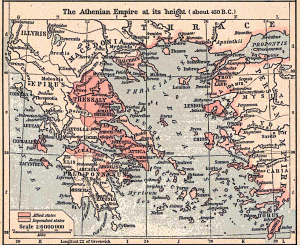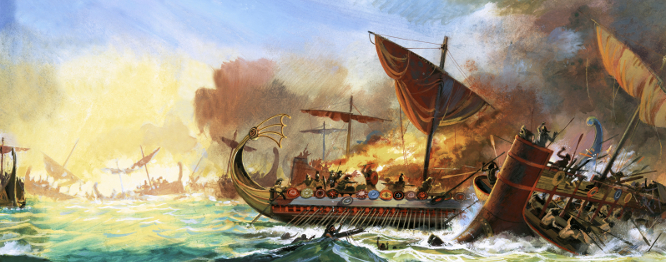This article is part of CIMSEC’s “Forgotten Naval Strategists Week.”
“I never learned how to tune a harp or play upon a lute but I know how to raise a small and obscure city to glory and greatness where to all kindred of the Earth will pilgrim.”
Thus spoke the great warrior politician Themistocles in the 5th Century B.C. Themistocles is famous for a lot of things: his heroic actions at the Battle of Salamis, his secret plot to rebuild Athens’ walls after the Second Persian War, and his six-pack abs in “300: Rise of an Empire” (author’s note: thoroughly underwhelmed by that movie). But his biggest impact on history was his fateful advocacy early in his career for Athens to build a first-rate navy. Themistocles should be recognized as one of the earliest naval theorists because he successfully promulgated a sea-view of the world and brought Athens onto the sea.
Portrait of a naval theorist.
Athens has gone down in history as a naval powerhouse but that was not always the case. The city of Athens is actually a few miles away from the sea, could only offer up fifty ships during the First Persian War, and did not even have a defensible port until Themistocles’ rise to prominence. Athens was a continental city-state and a poor one at that; it had little to offer in terms of natural resources. The striking of silver in the mines of Laurium in 483 B.C. changed this. Athens was faced with a choice of how to divide up the windfall. The prevailing idea was to take the money and divide it equally among the population. Themistocles, apparently alone, proposed to use the funds to finance construction of a 200 ship fleet and managed to win over the population. The rationale behind his advocacy is controversial to this day: he claimed that the navy’s purpose was to challenge Athens’ island rival, Aegina, but others have attributed to him the base motivations of wanting to secure power or the foresight to see the invasion of Xerxes coming three years later.
Regardless of Themistocles’ true motivations, though the high-minded ones seem more plausible, his success is remarkable because it achieved a full reorientation of Athens’ politico-military focus from land to sea. This was all the more surprising because ancient Greek culture gave primacy to the strength and heroism of land combat. Even Plato complained that Themistocles’ actions transformed the army “from steady soldiers… into mariners and seamen tossed about the sea… [Themistocles] took away from the Athenians the spear and the shield, and bound them to the bench and the oar.”
History proved Themistocles right. The 200 Athenian ships, combined with his deft admiralship, were instrumental in defeating the Persians at the Battle of Salamis and, far more than the Battle of Thermopylae, turned the tide of the war in Greece’s favor. Moreover, once the Persians retreated across the Aegean Sea, Athens used its fleet to liberate the occupied islands and Ionian cities in modern Turkey. The new Athenian dependencies evolved into the Athenian Empire whose domination of trade in the Aegean launched Athens’ golden age. Their art and architecture are still the standard by which we judge all others classics. It is difficult to say whether Themistocles foresaw all of these circumstances playing out when he first advocated for the fleet but his strategic argument for the Athenians to take to the sea reflects an appreciation for what dominating the sea could achieve.

The Athenian Empire at its height. If not for Themistocles, they would have had to swim to build it.
Lessons Learned
1) It is never too late to become a sea power.
History is full of examples of continental powers who failed to embrace the sea to their detriment: the Persians, Ming China, and the Ottomans are but a few. Themistocles’ success demonstrates that states, with proper planning and political determination, can alter policy and project their presence onto the water.
2) States should maintain a military force that augments their commercial interests.
For those following politics in the United States, the parable of the silver mines of Laurium might lead one to assume that Themistocles’ argument supports military spending at the expense of social programs. That is not entirely the case. Blanket military spending does not mean financial stability; the Habsburgs are a great cautionary tale for military spending becoming a money pit. The true reason why the Athenian navy was such a boon to the state was not just its military value but the commercial value in trade that it fostered after the Persian Wars ended. We conclude that the United States should be careful about making budget cuts to military forces that make the global trade system work. In particular, one needs to tread lightly around investments that are meant to counter maritime piracy; it is no accident that shipping insurance rates soar in places where the United States Navy does not patrol.
Matthew Merighi is a Masters Degree candidate at the Fletcher School of Law and Diplomacy at Tufts University.



One thought on “Lessons From History: Themistocles Builds a Navy”